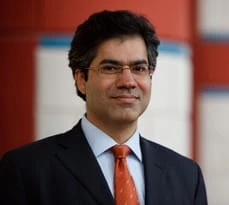To make an impact on policy, you need to get your hands dirty, as Dr Kamal Munir, author of Pakistan’s industrial policy, explains.


Having an impact on politics while remaining independent of it is a challenge for any academic interested in having their ideas implemented, but it’s a tricky tightrope Dr Kamal Munir is used to walking.
One of a select team who in 2011 delivered a comprehensive document outlining a proposed National Industrial Policy as well as an implementation framework to the Ministry of Industries, Pakistan, he remains sceptical about vested interests unwilling to implement its recommendations.
The National Industrial Policy recommendations are far-reaching, touching on almost every aspect of Pakistan’s public sector industry and infrastructure. It advises that Pakistan Railways be revived and made to carry a much larger proportion of freight; Pakistan International Airlines should be restructured to improve management and operational efficiency; the national energy policy needs to be revised to incentivise better management; energy be delivered on a preferential basis to industry; tariffs be revised to revive value-added industries; engineering and scientific institutions be set up to drive industry; and that a National Road Fund should be created to maintain and develop surface infrastructure.
These policies have the potential to have a very real impact on people’s lives,” says Munir, “and a very real impact on the Pakistani economy.
Munir has a strong track record of carrying his ideas beyond the academy into government, business and the media: he had acted as consultant or trainer for organisations that include the World Bank, the UK’s Department of Trade and Industry, the Asian Development Bank, ICI, McKinsey & Company, Shell and British Telecom, and his articles have appeared in, or been cited by major financial media outlets.
A concern with the ongoing process of economic liberalization in Pakistan led Munir to study how the banking sector is performing. His research challenged the perception that privatisation of Pakistan’s banks between 2000 and 2012 had led to a dynamic banking sector that spurred economic growth, finding instead that new bank owners were reaping huge profits at the expense of economic development.
“The banking market is dominated essentially by the same banks, except now they are in private hands,” said a November 2013 article co-authored by Munir in the publication Economic and Political Weekly. “The much lauded privatisation of banks in Pakistan seems to have taken a flawed but economically useful banking sector and turned it into a closely knit group of asset management companies which are allowed to make enormous profits with minimal risk. Such misguided policy has not only not solved most of the major problems identified in the pre-reform financial sector, but has instead left Pakistan with a banking sector which is institutionally unable to perform the necessary economic functions that banks have historically played in other countries at similar levels of development.”
Mirza Qamar Beg, who sits on the Board of the State Bank of Pakistan, claims that Munir’s “rigorous” policy analysis in areas such as banking, telecoms and energy “has strongly influenced the terms of the debate in Pakistan, and, I dare say, added to the policy space available to the decision makers here.”
“His work is well known here among the students and practitioners of public policy,” said Beg. “His work is considered influential. This assumes greater significance at a time like this when Pakistan is struggling with bold new economic reforms, really seeking a paradigm shift.”
Salim Raza, an ex-Governor of the State Bank, concurs, emphasising that Munir’s “work has made a contribution by drawing attention to an issue that is germane to development in Pakistan.”
At the bottom of the pyramid, Munir has been studying how microfinance is operating in Pakistan. A concern with the lives of ordinary people, as well as with the highest levels of government decision-making, prompted Munir to look at how well microfinance is functioning in Pakistan. This took him out on fieldwork meeting the impoverished rural women whose lives should – when the model works – be bettered by microfinance loans. Similarly, his groundbreaking analysis of Pakistan’s energy problems has been the subject of much debate amongst policy makers, and reported by the Financial Times among other publications.
A desire to ensure his work has impact not just upon policymakers, but on the real lives of Pakistan’s citizens, prompted Munir to issue a warning shortly before the 2013 elections on the worrying rise in inequality in Pakistan. His comment – “The most alarming thing is this inequality leading to social and political issues” – was reported and discussed in the national media.
In truth, Munir continues to guard his independence as a scholar to ensure greater impact for his advice.
Being an academic allows you to speak truth to power, but you lose this privilege if you become too cosy with those in power. This is why I will always prefer being an academic and an activist than a professional adviser.

